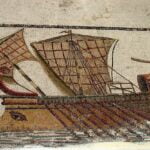Ancient Romans taught their children how to identify and recognize which plants and animals can be useful and how to use them in everyday life and in crafts.
In addition to obtaining food, the Romans used plants and animals in crafts, for example, for the production of cosmetics and dyes for clothes, as well as for medical purposes. They even used fully aware of the effects, of one recreational drug that did not come from the plant, but from the animal and more precisely fish, which caused hallucinations and sensations comparable to the effects of hallucinogenic mushrooms on the body.
We are talking about a fish called Sarpa salpa, easy to recognize by the golden stripes running along the side, in other respects it is a rather indistinct inhabitant of temperate and tropical waters, occurring in areas from the Atlantic coast of Africa to the Mediterranean. Although in appearance it may seem like a normal fish, it is not like that at all, because after eating it may occur hallucinations similar to the effects of LSD and hallucinogenic mushrooms, which the ancient Romans knew about.
The reason Salpa obtains its special properties is its own food, i.e. algae. Salpa is the only such fish in the Mediterranean that is herbivorous, and its favourite food is caulerpa taxifolia, i.e. algae containing neurotoxins. Fish feeds on it mainly at the end of summer, when all other algae stop growing and just then they take on their extraordinary properties when the algae ferment in their intestines. It should be noted, however, that only Salpa’s head is toxic, and eating it or decoction is manifested by visual and sound hallucinations, there may also be paralysis, abdominal pain, dizziness, muscle weakness, vomiting and nightmares. Symptoms disappear after a maximum of 36 hours from the time of eating the fish, after which such a person has amnesia and does not remember much about what happened during his action on the body.
According to the application, the Romans organized large banquets, which mainly served Salpa, they wanted to achieve a collective high.






